14 March 2018
IPEN and PAN met with Gertrude Sahler, President of SAICM, to share information about priorities for and questions about SAICM's Beyond 2020 process. IPEN Steering Committee Member Alexandra Caterbow (HejSupport) facilitated the discussion, which focused on highly hazardous pesticides, financing, and women and chemicals. Dr. Meriel Watts (PAN Asia Pacific) and Yuyun Ismawati (BaliFokus) also shared specific information about the loss of life and damage to health caused by the toxic impacts of pesticides and mercury use.
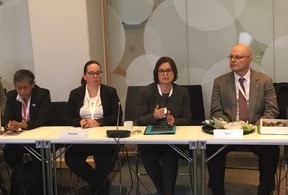
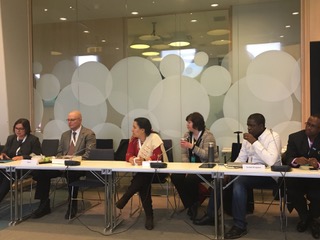
Today was a day for discussion in group sessions. Each group discussed the following five themes: Vision, Policy Principles, Objectives and Milestones, Implementation (Including finance) and Governance. The purpose of the discussion day was to “exchange views and foster an inclusive dialogue among all SAICM stakeholders.”
Each theme had two pre-assigned Co-Hosts. IPEN Co-Chair Dr. Olga Speranskaya and Mr. Rico Euripidou, from IPEN Participating Organization groundWork, were designated Co-Hosts. The Co-Hosts, which represented the five
United Nations regions as well as the five sectors represented in the Bureau (public interest organizations, health sector NGOs, labour sector NGOs, industry and IOMC), participated in each of the discussion groups to facilitate the dialogue and build on the discussions of each of the groups.
Following the conclusion of all the discussion groups, the Co-Hosts shared the findings from the groups in plenary. The findings (as presented by the Co-Hosts) will be consolidated into one paper and it will be presented to and shared with all the meeting participants on 15 March. The SAICM Secretariat notes, “Based on possible further input and comments in plenary, including inclusion of the plenary discussions on high-level political commitment and
visibility under agenda item 5(f), this paper may constitute the outcome of the second intersessional meeting and will be annexed to the report of the meeting, serving as input to the third meeting of the Open-ended Working Group.”

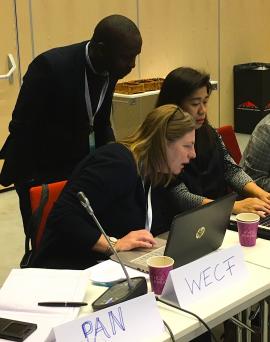
13 March 2018
IPEN Co-Chair Dr. Olga Speranskaya made an Opening Statement in plenary today, stating: "We hope that during these three days we will have time to discuss financial mechanisms that guarantee a sufficient and sustainable funding for the implementation of SAICM emerging policy issues and other issues of concern, and national implementation plans with agreed-upon measurable actions that contribute to implementation of Agenda 2030. We strongly believe that the key to securing sustainable funding for chemical safety is the internalization of costs within relevant producer industries."
Please click here to read the entire statment, as well as to see other interventions given in plenary.
Click here to view some of IPEN's participation in SAICM reported by International Institute for Sustainable Development/ Earth Negotiations Bulletin (IISD/ENB).
12 March, 2018
After attending an "Exchange of Views among SAICM Stakeholders" at the meeting venue today, IPEN set-up a display of information resources, which included IPEN's Beyond 2020 Perspectives as well as the recent report Stories of Women Workers in Vietnam's Electronics Industry, which IPEN published along with partner CGFED in Vietnam.
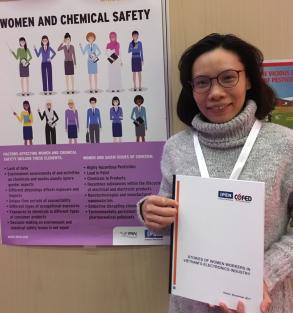
12 March, 2018
IPENers from around the world gathered in Solna, Sweden for a two-day preparatory meeting in advance of the 2nd Meeting of the Intersessional Process for SAICM beyond 2020, which begins on 13 March.
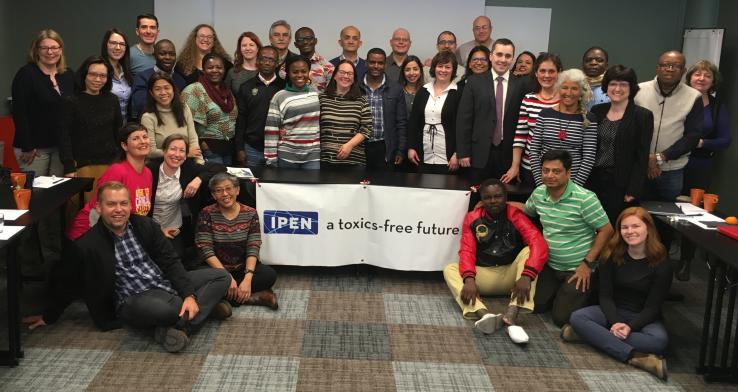
5 March, 2018
This "Quick Views" document highlights IPEN views on SAICM Beyond 2020 issues such as vision, policy principles, objectives and milestones, governance, high-level political commitment and financing. The document also follows IPEN comments that were provided to Brazil and Canada, the Co-Chairs of SAICM's "Beyond 2020" intersessional process.
4 March, 2018
The Strategic Approach to International Chemicals Management (SAICM) is the only international agreement that addresses the full range of known and newly discovered health and environmental concerns associated with the production and use of chemicals. The 2006 decision that established SAICM expires in 2020 and now there is a global process to determine what comes next. In 2017, in advance of the 1st Meeting of the Intersessional for Process for SAICM beyond 2020, IPEN and Pesticide Action Network collaborated to produce a series of documents that highlight civil society views on key topics for the Beyond 2020 process. The papers describe SAICM’s importance, how chemical safety can contribute to sustainable development, and how actions should be financed. In addition, the papers deal with the relationship between women and chemical safety, how the industry should reduce and eliminate hazard through design, and the connection between human rights and chemical safety. These papers continue to be relevant for the 2nd Meeting of the Intersessional Process, and you can read all the papers here.
